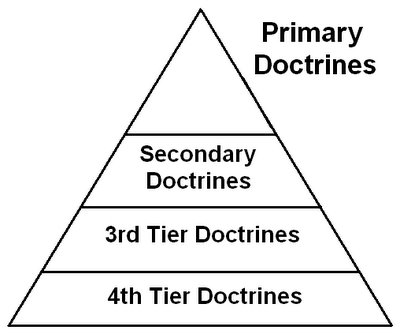Theological Triage
Any time we stop to discuss a theological issue, one of the first questions we should ask ourselves is how important is this?
After observing a triage unit in a local hospital, Dr. R. Albert Mohler, President of The Southern Baptist Theological Seminary in Louisville, KY, developed a system of Theological Triage to help us determine how important any given doctrine is to our spiritual lives.
Dr. Mohler’s system of theological triage divides all doctrines into three main categories:
Primary Doctrines – those doctrines which all Christians can agree on, and separates Christians from Non – Christians.
Secondary Doctrines – those doctrines which we must agree on in order to cooperate together. These doctrines separates Christians into different denominations.
Tertiary Doctrines – those doctrines which should not divide Christians.
Dr. Russell Moore, Dean of the School of Theology at SBTS, modifies Dr. Mohler’s system slightly to help us further assign importance to our doctrines. Dr. Moore subdivides the tertiary doctrines into 3rd tier and 4th tier doctrines. He notes that:
3rd tier doctrines are doctrines that we must agree on in order to cooperate within a local church. These doctrines would divide Christians into different local churches that are still able to cooperate within the same denomination.
4th tier doctrines are doctrines that Christians can "agree to disagree" and still remain in the same local church.
Thus, our theological triage pyramid would look like this:

While this system is very helpful, it does leave us with one big question: where do our various doctrines lie on this triage spectrum?
As I look at the various Christian doctrines, I believe that a good breakdown would be:
Primary Doctrines (Doctrines that all Christians should agree on) – Salvation through Christ alone through grace alone by faith alone. A proper understanding of God (Trinitarian, Human/Divine Nature of Christ). The physical resurrection of Christ.
Secondary Doctrines – (Doctrines that we must agree on to cooperate denominationally) – Biblical Inerrancy, The meaning, nature, and method of the ordinances (Baptism & Lord’s Supper). Security of the Believer. Gender Roles in church leadership.
3rd Tier Doctrines – (Doctrines that that we must agree on in order to cooperate within a local church) – Polity. Church Discipline. Tongues.
4th Tier Doctrines – (Doctrines that we can "agree to disagree" and still remain in the same local church) – Issues of Practical Holiness (Such as alcohol use). Millennial Views. Political Affiliation. Issues surrounding God’s sovereignty.
I think that this is a fair and balanced breakdown of Christian doctrines. However, In order for Christians to cooperate and not fight over tertiary (3rd & 4th tier doctrines), we must all agree on their proper place on the spectrum of triage – something that I seriously doubt will ever happen.
Take for example the issue of tongues – an issue that, in my opinion, gets discussed way too much given the fact that it is a tertiary doctrine.
I have met many people who have assigned this doctrine to very different places on the triage spectrum.
I have friends from college who hail from a Fundamentalist Pentecostal position, who argue that because tongues illustrates the receipt of the Holy Spirit, all people who are saved will speak in tongues – thus elevating the doctrine to a primary position.
Even though I see tongues as a tertiary doctrine, I cannot cooperate with these people in spiritual endeavors.
I have other friends who feel that one can be saved and not speak in tongues. However, they feel that glossolalia is normative and all Christians should seek out the gift – elevating the doctrine to a secondary doctrine.
I have an easier time cooperating with these people, but still, we should probably remain in different denominations
I also have friends who are of the "3rd wave charismatic" persuasion – people who agree that tongues is a tertiary doctrine - but for some reason they think that everyone must see glossolalia as possible, so they talk about it and argue about it every chance they get.
I do have a hard time cooperating with these people. Not so much because of their theological position, but because they’re jerks about it.
Agreeing on the proper place of our doctrines on the spectrum of theological triage (and treating said doctrines accordingly) will do much to help us cooperate with others who disagree with us over tertiary doctrines. I believe that agreement in this area will also help us to define the "size of the tent" in the SBC.

0 Comments:
Post a Comment
<< Home